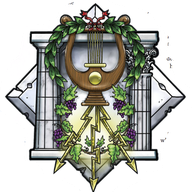The World was born of the great chasm, Chaos, from whence arose Gaia, who birthed her equal, Uranus, to enshroud her in the sky. To Uranus, Gaia bore 12 great Titans, the Cyclopes, and the Hundred-Handed — but Uranus, fearful of his children’s power and hateful of their appearance, confined the Cyclopes and the Hundred-Handed in Tartarus, far beneath Gaia, which caused her great pain. She fashioned a knife of flint and bestowed it upon her son, Cronus, who castrated his father and flung his genitals into the sea. Now preeminent, he took his sister Rhea for a wife, and to Cronus she bore six children — three daughters, and three sons.
But Cronus, who had learned well the lesson of his father Uranus, had no desire to be overthrown himself. Though at first he freed them, in time he reimprisoned the Hundred-Handed and Cyclopes in Tartarus, fearful of their power. Told he was destined to be overthrown by his own issue, he swallowed each of his six children, three daughters and three sons, as they were born. But Rhea, with the aid of Uranus and Gaia, tricked Cronus — swaddling a great stone that Cronus unthinkingly devoured, she spirited her youngest son, Zeus, to safety. When he was grown, he returned and overcame Cronus, who was made to vomit up his five children and a single stone.
Cunning Zeus freed the Hundred-Handed and the Cyclopes from Tartarus, and they in turn gave him thunder and lightning, the greatest of weapons. The terrible decade-long war between the Titans and the Theoi that followed came to be known as the Titanomachy, and when it ended triumphant Zeus imprisoned the Titans in Tartarus, setting the Hundred-Handed to guard its gates that they might never escape. Zeus then drew lots with his brothers, Hades and Poseidon, to determine how to split the rule of the world between them: Zeus drew the sky, Poseidon the sea, and Hades the dread realm of the dead — the earth itself was left in common between them.
From high on Olympus, Zeus still reigns over the Theoi, ever-watchful of his many, many children — for after all, he too bears a certain destiny.
